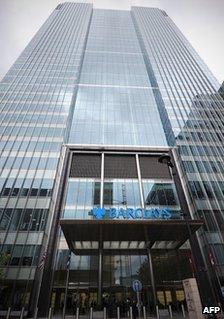Could Barclays’ review spur break-up of bank?
- Published
- comments

Might Barclays' retail and investment arms be separated?
Is it possible that Barclays' board has been misled by Anthony Salz's urbane manner and establishment background into thinking that his review of the bank's business practices will deliver an answer to them which is comforting and anodyne?
I have known the former Freshfields senior partner for donkey's years. And my impression has consistently been that he is tough and moral. There is a chance that he could leave Barclays in the embarrassing position of having to make difficult choices about its structure which it might wish to avoid.
It is significant, I think, that in agreeing to lead the review, Anthony Salz insisted on the right to publish his report, even if Barclays itself does not like his analysis or conclusions.
And it is interesting that, for him, the fundamental question is whether it is possible to have an effective single code of conduct for a universal bank like Barclays, when the motivations and instincts of investment banking traders and branch managers are so different.
If he were to conclude that it is pretty difficult to create a homogenous culture of putting the customer first in an organisation that contains both a giant retail bank and a giant investment bank - and my impression is that he is sceptical such a culture can be nurtured and firmly rooted - would that reinforce the case for breaking up Barclays?
As to the nitty gritty, his plan is to make and publish his recommendations by the time of Barclays' next annual meeting in April. He has been told he can interview anyone he likes, including - for example - the Barclays traders accused of trying to manipulate interest rates.
That said, he will not do an investigation of precisely who was responsible for the sins of the past, such as the attempts to rig Libor, the misselling of PPI credit insurance and the inappropriate sales of complicated financial products such as swaps to small businesses. Instead, he will endeavour to understand what it was about Barclays' culture and business practices that allowed those sins to be committed.
So, for example, he will look not only at the content of the group's existing codes of conduct, but how and whether those codes are translated into behaviour. The hope of Barclays is that a single code of conduct for the entire bank can be written and procedures put in place to make it effective.
An 'impossible dream'?
This notion of "One Barclays" is what Bob Diamond was trying to mould before the governor of the Bank of England and the chairman of the Financial Services Authority lost confidence in him, and he quit.
But what if Mr Salz determines that "One Barclays", in a cultural and ethical sense, is a naive and impossible dream?
One solution would be to augment the new financial ring fence between retail banks and investment banks, that is being forced on universal banks by the government, with a behavioural ring fence - such that expectations of the conduct of retail bankers would be different from those of investment bankers.
Or, some might argue, a cleaner solution would be to physically separate the retail bank and investment bank - or to put it in starker terms, to break up Barclays.